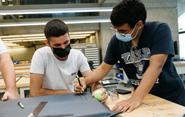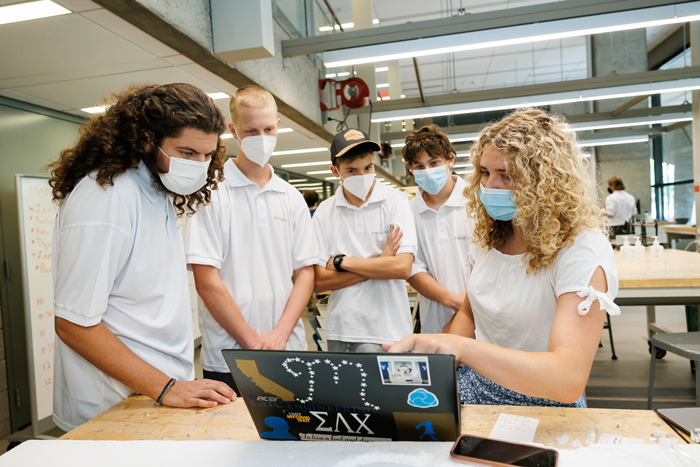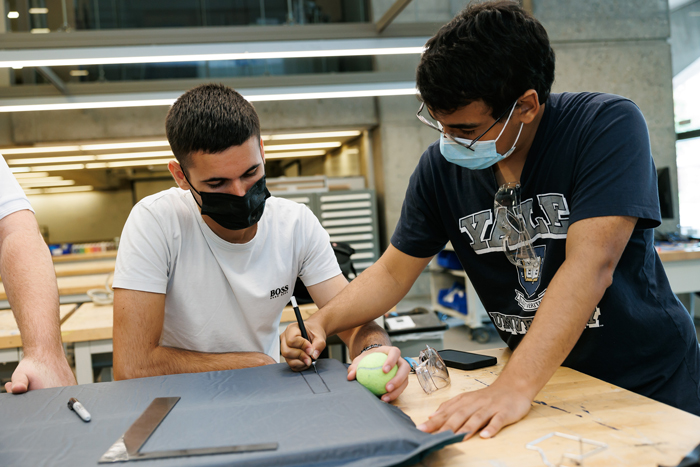CEID Hosts Israeli Students for Weeklong Workshop on Product Commercialization

A group of Israeli high school students who will soon be attending Technion – Israel Institute of Technology came to Yale for a weeklong workshop at the Center for Engineering Innovation and Design (CEID), where they learned the real-world aspects of turning student projects into commercial products.
 Eleven students from the Ort Comprehensive School, one of the largest high schools in Israel, worked with students and staff at the CEID on several hands-on, experiential learning activities. For the main component of their visit, they worked on three projects that originated with Yale students at the CEID: An exercise training device designed to measure the speed of the user's movements; a stringless bass musical instrument; and a device to measure the accuracy of a tennis serve.
Eleven students from the Ort Comprehensive School, one of the largest high schools in Israel, worked with students and staff at the CEID on several hands-on, experiential learning activities. For the main component of their visit, they worked on three projects that originated with Yale students at the CEID: An exercise training device designed to measure the speed of the user's movements; a stringless bass musical instrument; and a device to measure the accuracy of a tennis serve.
The Israeli students first worked on these projects among themselves in Israel, using the tools they had available, including RoboPhysics, a software and hardware product that uses sensor technology, artificial intelligence, and Bluetooth. They then presented their results at the CEID.
"The purpose was to show that you can have different teams on different continents work on the same problem and one design can produce results that can influence the other," said SEAS Deputy Dean and CEID Director Vincent Wilczynski. "And to see how the use of tools that are most available in your community can best be used to solve a problem."
They were then embedded with teams of Yale students currently at the CEID as Summer Fellows. The velocity training device group went to Yale's Payne Whitney Gym to conduct real-time testing. The tennis device team manufactured additional units so that they could evaluate the product at Yale's tennis facilities. And the students working on the musical instrument met with a professional musician to discuss market testing.
"The students were introduced to design topics such as the progression of a student project, internal design iterations, production, market testing, and then evaluation," Wilczynski said. "They worked hand-in-hand on industrial design in manufacturing and engineering to produce commercial products."
Dr. Nira Krumholtz, head of the IDEA Center in Israel, said working with the Yale students gave the Israeli students the rare opportunity to work on a project beyond the theoretical and prototype stages.
"You learn best when you develop some product - you know why you are learning, and you know what problem you are tackling," she said.
"Here at the CEID, they're dealing with the product," added Moshe Lahav, a supporter of the project. "What the Israeli students gain by coming here is through working on the last stage of the production."
 For their part, the Israeli students said the workshop allowed them to take their engineering projects to a new level.
For their part, the Israeli students said the workshop allowed them to take their engineering projects to a new level.
"This is a side of engineering here that we have yet to be exposed to," said Ori Keren, an Israeli student who worked on the tennis device. "In school, we work on the 2D simulation, and after that, the work stops. Here you have workshops, you have soldering, you have laser printing - stuff like that. We've never seen that."
"We're learning things that we've never done before," added Biata Shindel, also an Israeli student, who worked on the velocity training device.
Their teacher, Itamar Feldman, said the trip drove home the idea to his students that engineering "is not only thinking about circuits."
"Here, we meet the real world, where somebody needs something - how do we do that?" he said. "We need to do the economics of it, the design of it. It's not only the controller and the electronics. There's a lot of aspects to it."
In addition to working on the team projects, the Israeli students attended traditional CEID workshops, including those on Arduino programming and concrete fabrication. They also visited labs, museums, and various sites at the university. Dr. Katherine Schilling, associate research scientist in chemical and environmental engineering, led a workshop at the Greenberg Engineering Teaching Concourse (GETC) on the materials science of paint. Menachem Elimelech, the Sterling Professor of Chemical and Environmental Engineering, hosted the students in his lab to learn about his research on water desalination, which has been critical to the drinking water supply in Israel. Speaking from Vietnam by Zoom, SEAS alumnus Gordon McCambridge discussed his work with the CEID in manufacturing the RepBox, an exercise device that's part of SEAS' Projects to Products student program.
Speaking by Zoom at the closing ceremony, Orit Farkash-Hacohen, Israel's Minister of Science, Technology and Space, said she was "happy and inspired" by the collaboration between the two countries.
"It is so wonderful to see Israel's brightest kids receive practical tools from students and Yale experts," she said.
Calling the CEID a "portal to the world for innovation at Yale," SEAS Dean Jeffrey Brock said these kinds of international efforts are critical to the mission of Yale and to the School.
"Your willingness to come and be with us in this program, participate and bring your expertise and creativity, is deeply meaningful," he said.

